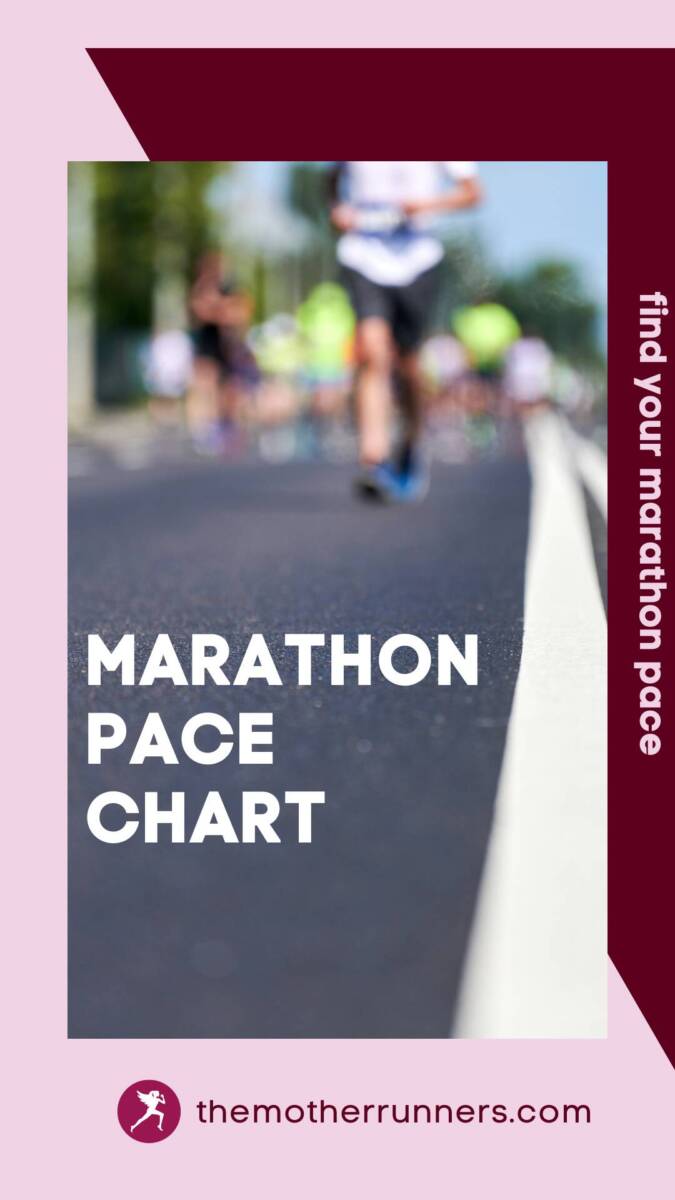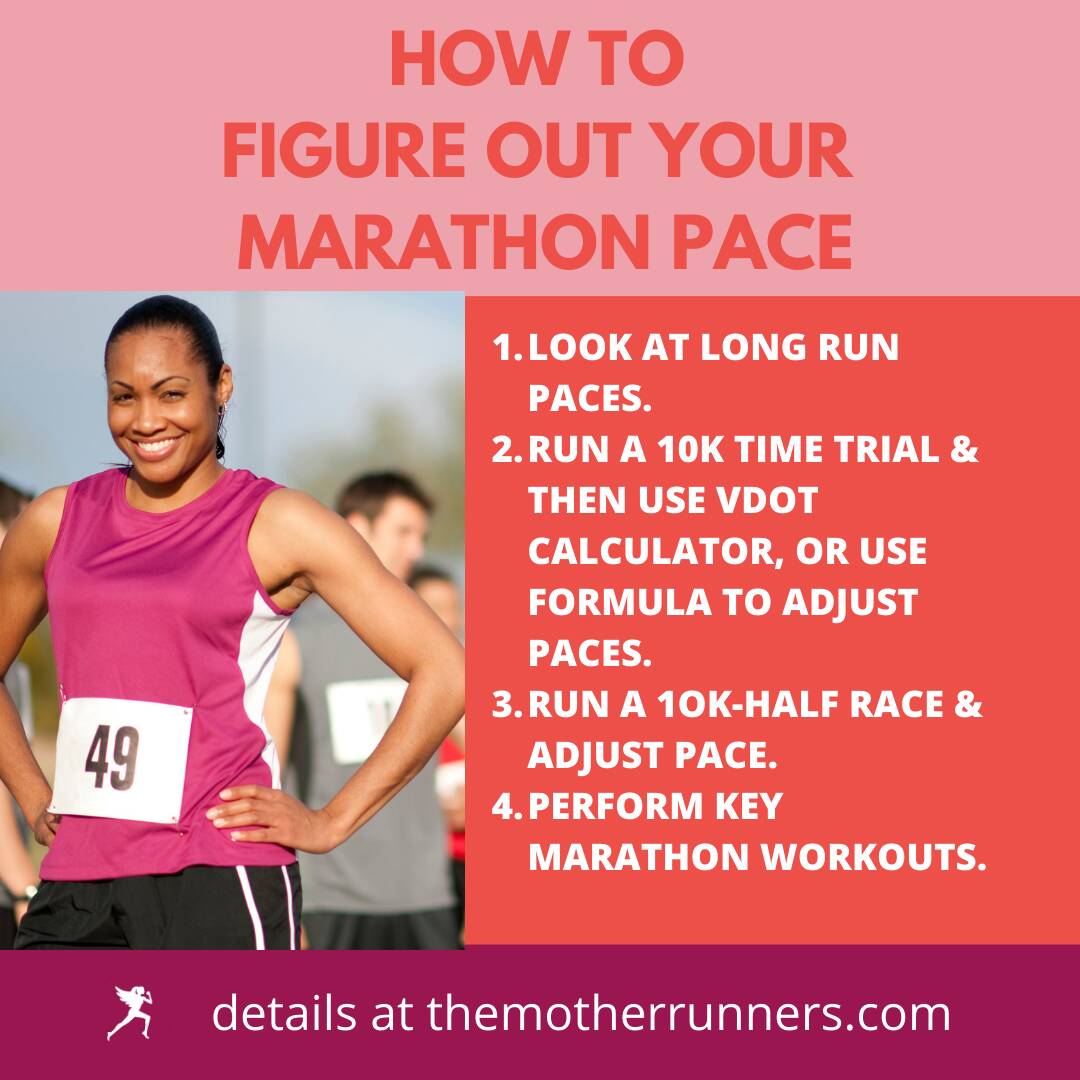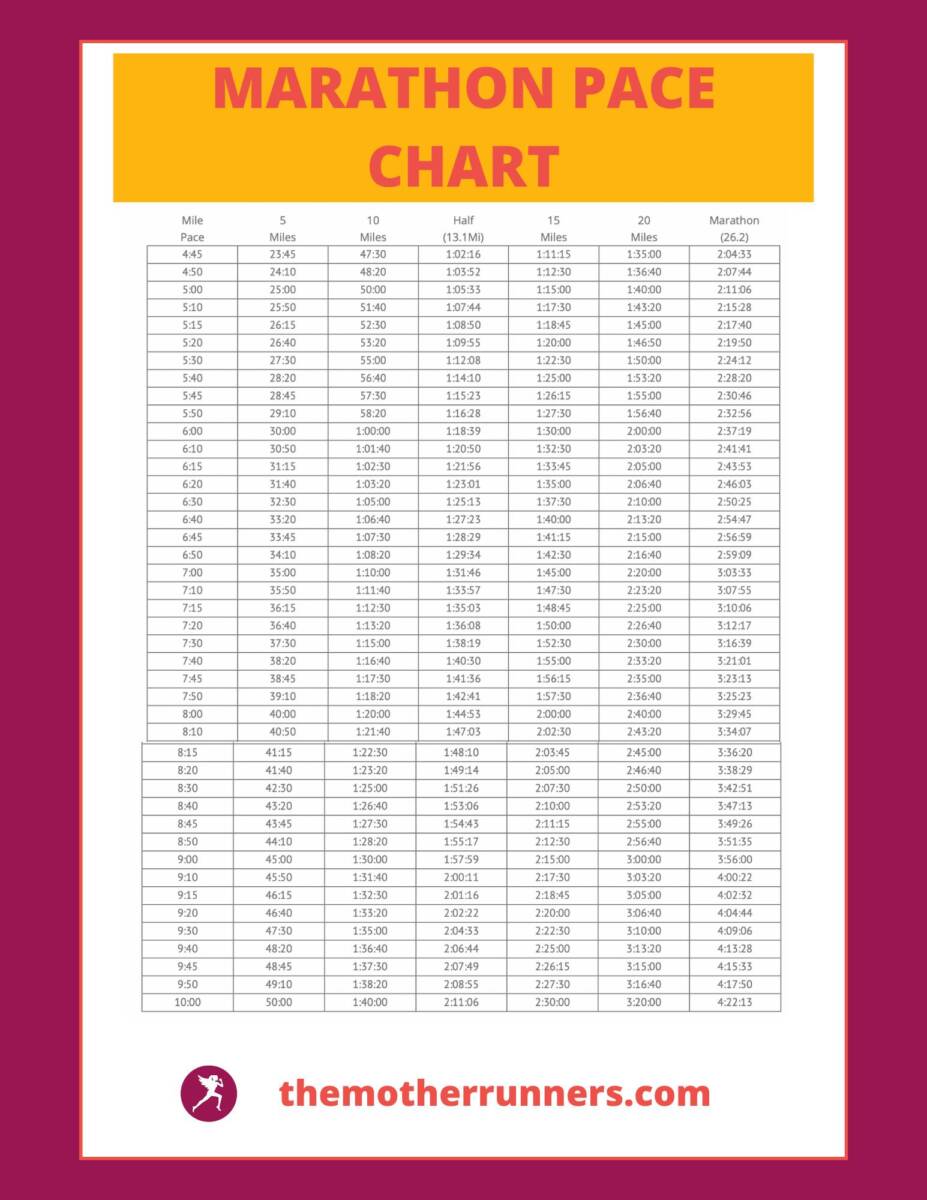You can find your marathon pace by looking at your training. If you are a new marathoner or average 9:45 minute per mile pace, then your long run pace is likely your marathon pace. If you are a more experienced or faster runner, past race performances, time trials, and training runs can give you an idea of your pace. Read on to learn more.
Trying to figure out your marathon pace can be a tough puzzle—especially if you haven’t run a marathon before or you haven’t run a marathon in a while. The marathon is a long event and the challenge should not be underestimated.
It can be hard to know what it is like to hold a pace for the entire race. Many people think they can run a Boston Marathon qualifying time without knowing what it feels in the later stages of running 26.2 miles. It’s much better to underestimate your race pace and have strong finish, than to overestimate and flame out.

Thankfully there are clues in your training to help you figure out your pace for the marathon.
In most cases, you won’t be able to accurately predict your marathon pace until you are approaching your marathon taper—so 2 to 3 weeks out from marathon race day. This is when your body is closest to its peak marathon fitness.
Check out my deep dive into how to predict your marathon time here (including marathon workouts to help you figure out your pace).
Related: 8 Racing Strategies to Give You an Edge
Here are three ways to figure out your marathon goal race pace.
- Long Runs
- Time Trial
- Race performances
- Marathon workouts
How to Predict Your Marathon Pace
1. Use Your Long Run Pace
For first-time marathoners. You’ll want to use your average pace for your long run as a predictor for your race pace.
Using your long-run pace to calculate your pace for 26.2 is best for those who are:
- running their first marathon
- wanting to complete the marathon with no time goal,
- and/or will run a marathon at or above 4 hours and 15 minutes (long run paces exceed 9:45 a mile).
If your long run pace is faster than 9:45 and you don’t feel gassed at the end of your long runs, then you may be able to set a target marathon time goal with a faster pace.
Look at the next two ways to predict your marathon time to determine your marathon pace.

Related: Tips to Overcome Race Anxiety
2. Run a Time Trial
If you would like to have a marathon time goal but have no recent race performances, running a time trial is a great way to figure out your marathon goal pace.
The longer distance for this fitness test (common distance of 5k to half marathon distance), the more accurate your marathon pace prediction will be. For this example, I will use a 10k time trial.
Find a flat, uninterrupted course to run a 10k (6.2 miles). Do a light warm-up of 1-2 miles and dynamic stretches. Then do your time trial. (Learn how to pace yourself here).
Take your 10k time and use the Jack Daniel’s VDOT calculator to predict your marathon time. The VDOT calculator is the most accurate race pace prediction calculator with some nuances as the VDOT race equivalency calculator is derived from data of elite runners who run 70 miles per week. If this is not you, make the following edits:
Related: 9 Mental Training Hacks from a Sports Psych
Sub 3-hour marathoners:
- Add 0-5 minutes to your predicted marathon time. Then calculate pace or look at my pace chart below.
3-4:15 hour marathoners:
- Add 5-7 minutes to your VDOT marathon prediction. Then calculate pace or look at my pace chart below.
4:15+ marathoners:
- Your long run pace is likely close to your marathon race pace.
Related: 26 Pro Marathon Race Day Tips
Ideally, you will do this after your marathon base phase so inform your training paces. You can then repeat the time trial to get a more accurate marathon race pace prediction as your fitness improves.
Related: What is Rate of Perceived Exertion? & How to Use It in Training

3. Use a Race Performance
It is ideal if you can run a race longer than a 5k during your marathon training cycle to predict your goal marathon pace. The longer the race, the more accurate the prediction—but you don’t want the race to be too taxing needing lots of recovery time. A half marathon about 6 weeks out from your goal marathon is a perfect tune-up for the marathon.
If you can’t find a race before marathon, that’s ok! You can use recent race performance to help predict your marathon time.
Repeat the steps above using the race pace calculator, or use the following formulas to estimate your marathon pace from common race distances:
- 10k race pace plus 45 seconds per mile
- 15k race pace add 30 seconds per mile
- Half marathon pace add 20-25 seconds per mile
These are generalizations and there are exceptions to every rule. But these race pace formulas can give you a ballpark of your marathon race pace. If you run a goal marathon pace during your training and it feels too easy or hard, you can tailor these paces. (Learn more about how to run by effort level here).
Related: 13 Tips to Nail Your PR

4. Run Marathon Training Workouts
This strategy to figure out your marathon pace is best for someone who has an idea for a marathon target time in mind. In most cases, these are runners who think they can run a 4:15 marathon (9:45 mile pace) or faster.
If you think you can run a specific time for the full marathon, then these marathon pace workouts can help you figure out if this is a realistic marathon time goal.
Related: How to Taper for a Marathon
- Long run marathon pace workout marathon pace 4, 3, 2, 1: Warm up for 2-3 miles then do 4 miles at an RPE (rate of perceived exertion) of 5-6/10, 1 mile easy, then do 3 miles at an RPE of 5-6, 1 mile easy, 2 miles RPE 5-6, 1 mile easy, then 1 mile more at RPE 5-6, cool-down for 2-3 miles. RPE of 5-6 is a moderate effort. You can speak in short sentences but not hold a conversation. The average pace for these miles will be a good goal marathon pace.
- Steady state workout: Warm-up for 2-3 miles, then do a steady run at an RPE of 5-6 for 10 miles, cool-down for 2-3 miles. The average pace of this workout plus 25-35 seconds will be a good goal marathon pace.
- Tempo run pace workout: Warm-up for 2 miles then do 3 by 10 minutes at a threshold pace (RPE 7) with a 90-second interval rest in between. Cool-down for 2 miles. The average pace of this workout (or similar tempo runs of 20-30 minutes) plus 25-30 seconds will likely be a good goal marathon pace.
Related: How to Taper for a Marathon or Half Marathon
To calculate your corresponding finish time based on your marathon pace, use this marathon pace chart.
Marathon Pace Chart
I hope these tips help you get your goal time as you cross the marathon finish line!

If you want guidance with your marathon training, check out my running coach services. Also, be sure to check out my free training plans:
